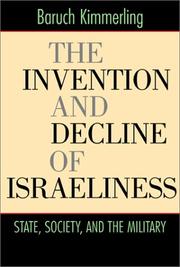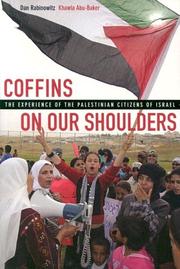| Listing 11 - 15 of 15 | << page >> |
Sort by
|

ISBN: 0745321216 0745321208 9780745321219 9780745321202 Year: 2003 Publisher: London Pluto
Abstract | Keywords | Export | Availability | Bookmark
 Loading...
Loading...Choose an application
- Reference Manager
- EndNote
- RefWorks (Direct export to RefWorks)
Refugees, Arab --- Palestinian Arabs --- Israel-Arab War, 1948-1949 --- Arab-Israeli conflict --- Government policy --- Refugees --- Israel --- Politics and government --- Ethnic relations --- #gsdb8 --- Arab refugees --- Israel-Arab conflicts --- Israel-Palestine conflict --- Israeli-Arab conflict --- Israeli-Palestinian conflict --- Jewish-Arab relations --- Palestine-Israel conflict --- Palestine problem (1948- ) --- Palestinian-Israeli conflict --- History --- Ethnic relations. --- Refugees, Arab - Government policy - Israel --- Palestinian Arabs - Government policy - Israel --- Israel-Arab War, 1948-1949 - Refugees --- Israel - Politics and government - 20th century --- Israel - Ethnic relations

ISBN: 0520939301 1597346861 9780520939301 0585467897 9780585467894 9781597346863 0520229681 9780520229686 9780520246720 0520246721 Year: 2001 Publisher: Berkeley University of California Press
Abstract | Keywords | Export | Availability | Bookmark
 Loading...
Loading...Choose an application
- Reference Manager
- EndNote
- RefWorks (Direct export to RefWorks)
This thought-provoking book, the first of its kind in the English language, reexamines the fifty-year-old nation of Israel in terms of its origins as a haven for a persecuted people and its evolution into a multi- cultural society. Arguing that the mono-cultural regime built during the 1950's is over, Baruch Kimmerling suggests that the Israeli state has divided into seven major cultures. These seven groups, he contends, have been challenging one other for control over resource distribution and the identity of the polity. Kimmerling, one of the most prominent social scientists and political analysts of Israel today, relies on a large body of sociological work on the state, civil society, and ethnicity to present an overview of the construction and deconstruction of the secular-Zionist national identity. He shows how Israeliness is becoming a prefix for other identities as well as a legal and political concept of citizen rights granted by the state, though not necessarily equally to different segments of society.
National characteristics, Israeli. --- Jews --- Religion and state --- Israeli national characteristics --- Identity. --- Israel --- Social conditions --- Ethnic relations. --- National characteristics, Israeli --- Identity --- Ethnic relations --- Jews - Israel - Identity --- Israel - Social conditions - 20th century --- Israel - Ethnic relations --- 20th century. --- citizen rights. --- cross cultural. --- cultural history. --- demographic study. --- ethnicities. --- historians. --- israel. --- israeli military. --- israeli society. --- israeli state. --- judaism. --- middle east. --- modern history. --- multicultural society. --- national identity. --- nationalism. --- nonfiction. --- political analysts. --- political science. --- political. --- resource distribution. --- secular zionists. --- social scientists. --- social studies. --- sociological study. --- sociologists. --- thought provoking.
Book
ISBN: 1484374460 1498338119 Year: 2015 Publisher: Washington, D.C. : International Monetary Fund,
Abstract | Keywords | Export | Availability | Bookmark
 Loading...
Loading...Choose an application
- Reference Manager
- EndNote
- RefWorks (Direct export to RefWorks)
The paper utilizes a theoretical stock-flow accounting model of the labor market, similar to Blanchard and Diamond (1989). Identifying restrictions are derived from the theoretical model and are imposed on a SVAR system. The estimation allows for decomposing fluctuations to their cyclical and structural components. The model is applied to the Israeli economy. The estimates suggest that non-cyclical factors account for at least half of the decline of the unemployment rate during the period between 2004-Q1, when unemployment peaked at 10.9 percent, and 2011-Q4, when it marked a trough at 5.4 percent; suggesting a shift inward of the Beveridge curve.
Discrimination in employment -- Israel. --- Israel -- Ethnic relations. --- Labor market -- Israel. --- Manpower policy, Rural -- Israel. --- Labor --- Employment --- Unemployment --- Wages --- Intergenerational Income Distribution --- Aggregate Human Capital --- Aggregate Labor Productivity --- Business Fluctuations --- Cycles --- Unemployment: Models, Duration, Incidence, and Job Search --- Labor Force and Employment, Size, and Structure --- Demand and Supply of Labor: General --- Labour --- income economics --- Labor force --- Labor supply --- Labor markets --- Unemployment rate --- Labor market --- Israel --- Income economics

ISBN: 0520936906 1282359622 9786612359620 159734625X 9780520936904 0585466467 9780585466460 0520230809 9780520230804 0520236572 9780520236578 9781597346252 9781282359628 6612359625 Year: 2003 Publisher: Berkeley University of California Press
Abstract | Keywords | Export | Availability | Bookmark
 Loading...
Loading...Choose an application
- Reference Manager
- EndNote
- RefWorks (Direct export to RefWorks)
James Ron uses controversial comparisons between Serbia and Israel to present a novel theory of state violence. Formerly a research consultant to Human Rights Watch and the International Red Cross, Ron witnessed remarkably different patterns of state coercion. Frontiers and Ghettos presents an institutional approach to state violence, drawing on Ron's field research in the Middle East, Balkans, Chechnya, Turkey, and Africa, as well as dozens of rare interviews with military veterans, officials, and political activists on all sides. Studying violence from the ground up, the book develops an exciting new framework for analyzing today's nationalist wars.
Israel - Ethnic relations - Political aspects. --- Serbia - Ethnic relations - Political aspects. --- Serbia - Politics and government - 1992-. --- Serbia-- Ethnic relations-- Political aspects. --- State-sponsored terrorism. --- State-sponsored terrorism - Israel. --- State-sponsored terrorism - Yugoslavia - Serbia. --- State-sponsored terrorism --- Regions & Countries - Europe --- History & Archaeology --- Balkan Peninsula --- Serbia --- Israel --- Ethnic relations --- Political aspects. --- Politics and government --- Government violence --- Governmental violence --- State-sponsored violence --- State terrorism --- Violence, Governmental --- Violence, State-sponsored --- Izrailʹ --- Medinat Yiśraʼel --- Yiśraʼel --- Izrael --- Isrāʼīl --- Israele --- Isŭrael --- I-se-lieh --- Medinat Israel --- State of Israel --- ישראל --- מדינת ישראל --- إسرائيل --- دولة إسرائيل --- Dawlat Isrāʼīl --- Ізраіль --- Дзяржава Ізраіль --- Dzi︠a︡rz︠h︡ava Izrailʹ --- Stát Izrael --- Država Izrael --- Ισραήλ --- Израиль --- Государство Израиль --- Gosudarstvo Izrailʹ --- イスラエル --- Isuraeru --- 以色列 --- Yiselie --- SRS --- RS de Serbije --- SR Srbija --- Srbija --- Servia --- Sot︠s︡ialisticheskai︠a︡ Respublika Serbii︠a︡ --- Serbii︠a︡ --- Narodna Republika Srbija --- N.R. Serbii︠a︡ --- NR Serbii︠a︡ --- Socialist Republic of Serbia --- Republic of Serbia --- Socijalistička Republika Srbija --- Republika Srbija --- People's Republic of Serbia --- Szerbia --- Србија --- Political atrocities --- Terrorism --- Serbia and Montenegro --- Palestine --- Terrorisme d'Etat --- Serbie --- Israël --- Relations interethniques --- Aspect politique --- Politique et gouvernement --- africa. --- anthropology. --- balkans. --- chechnya. --- comparative politics. --- cultural anthropology. --- cultural social. --- ethnic studies. --- frontier life. --- government officials. --- history of violence. --- human rights. --- institutional violence. --- interviews. --- israel. --- jewish ghettos. --- middle east. --- military veterans. --- nationalism. --- political activists. --- political analysts. --- political violence. --- political. --- serbia. --- sociologists. --- state violence. --- theoretical framework. --- turkey. --- war. --- warring states.

ISBN: 1282771892 9786612771897 1423714911 0520938968 1598755234 9780520938960 9781423714910 9781598755237 9780520244412 0520244419 9780520245570 0520245571 9781282771895 6612771895 Year: 2005 Publisher: Berkeley University of California Press
Abstract | Keywords | Export | Availability | Bookmark
 Loading...
Loading...Choose an application
- Reference Manager
- EndNote
- RefWorks (Direct export to RefWorks)
This highly original historical and political analysis of the Arab-Israeli conflict combines the unique perspectives of two prominent segments of the Middle Eastern puzzle: Israeli Jews and the Palestinian citizens of Israel. Written jointly by an Israeli anthropologist and a Palestinian family therapist born weeks apart to two families from Haifa, Coffins on Our Shoulders merges the personal and the political as it explores the various stages of the conflict, from the 1920's to the present. The authors weave vivid accounts and vignettes of family history into a sophisticated multidisciplinary analysis of the political drama that continues to unfold in the Middle East. Offering an authoritative inquiry into the traumatic events of October 2000, when thirteen Palestinian citizens of Israel were killed by Israeli police during political demonstrations, the book culminates in a radical and thought-provoking blueprint for reform that few in Israel, in the Arab world, and in the West can afford to ignore.
Social integration --- Arab-Israeli conflict --- Palestinian Arabs --- Israel-Arab conflicts --- Israel-Palestine conflict --- Israeli-Arab conflict --- Israeli-Palestinian conflict --- Jewish-Arab relations --- Palestine-Israel conflict --- Palestine problem (1948- ) --- Palestinian-Israeli conflict --- Arabs --- Arabs in Israel --- Israeli Arabs --- Influence. --- Politics and government. --- Legal status, laws, etc. --- Social conditions. --- History --- Israel --- Ethnic relations. --- #SBIB:327.6H01 --- #SBIB:328H512 --- #SBIB:39A77 --- Influence --- Legal status, laws, etc --- Politics and government --- Social conditions --- Internationale en diplomatieke relaties: specifieke conflicten --- Instellingen en beleid: Midden-Oosten / landen in het Midden-Oosten --- Etnografie: Noord-Afrika en het Midden-Oosten --- Palestinian Arabs -- Israel.. --- Palestinian Arabs -- Israel -- Social conditions.. --- Palestinian Arabs -- Legal status, laws, etc. -- Israel.. --- Palestinian Arabs -- Israel -- Politics and government.. --- Arab-Israeli conflict -- Influence.. --- Social integration -- Israel.. --- Israel -- Ethnic relations. --- 20th century. --- anthropologists. --- anthropology. --- arab israeli conflict. --- arab world. --- cultural conflict. --- cultural studies. --- family histories. --- haifa. --- historians. --- historical analysis. --- historical. --- israel. --- israeli jews. --- israeli palestinians. --- middle east. --- multidisciplinary analysis. --- nonfiction. --- palestine. --- palestinians. --- personal experiences. --- political analysis. --- political conflict. --- political perspective. --- thought provoking. --- western perspective.
| Listing 11 - 15 of 15 | << page >> |
Sort by
|

 Search
Search Feedback
Feedback About UniCat
About UniCat  Help
Help News
News